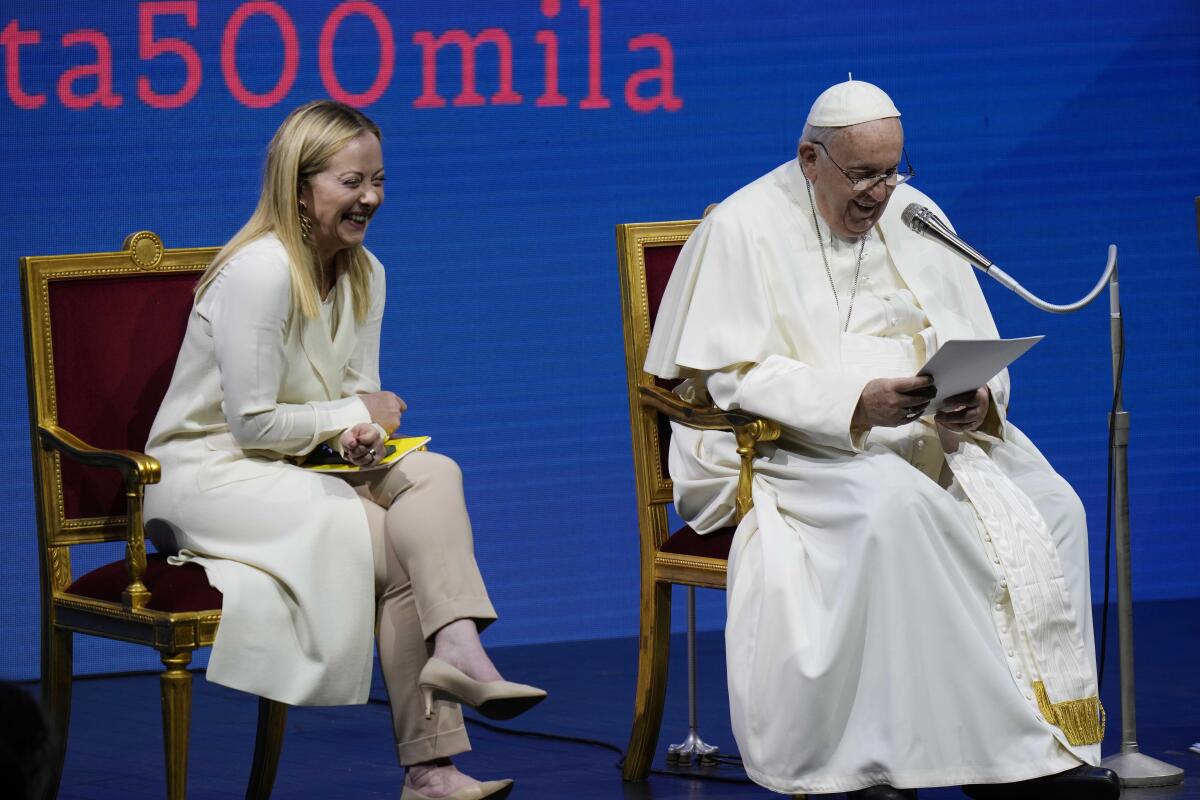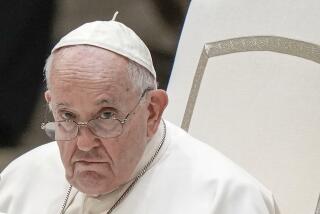Pope joins in urging Italians to have more kids, not just pets

ROME — Pope Francis joined Italy’s conservative premier on Friday in encouraging Italians to have more children, denouncing the financial precariousness facing young couples and “selfish, egotistical” choices that have led to a record-low birthrate that is threatening the country’s economic future.
Francis urged concrete political action to invert the “demographic winter,” which in population terms resulted in the disappearance of a city the size of Bari last year. Castigating couples who have pets instead of children, Francis called for resources to be dedicated to helping couples expand their families, saying it was necessary to “plant the future” with hope.
“Let us not resign ourselves to sterile dullness and pessimism,” Francis told an annual gathering of pro-family organizations. “Let us not believe that history is already marked, that nothing can be done to reverse the trend.”
Italy recorded a record-low number of live births last year, 392,598, which combined with an elevated number of deaths, 713,499, has accelerated the demographic trend that threatens to crash the country’s social security system. The government of Prime Minister Giorgia Meloni is backing a campaign to encourage at least 500,000 births annually by 2033, a rate that demographers say is necessary to prevent the economy from collapsing by expanding the wage-earning population as retirees draw on their pensions.
As South Korea hits the world’s lowest birth rate, a rural elementary school struggles to stay open amid a nationwide drop-off in school-age children.
Meloni came to power last year on a campaign of “God, family, fatherland,” and her government has proposed a host of measures to try to encourage families to have more children, including tax cuts to increase spending power, given that Italy’s fertility rate of 1.24 children per woman is among the lowest in the world.
Numerous studies have pointed to a combination of factors that discourage women from having children, including a lack of affordable child-care spots, low salaries and precarious work contracts, and a tradition of women often bearing the burden of caring for older parents.
Meloni, who has a daughter with her partner, told the family association congress that it was time to reverse the trend.
But she said it must be done without resorting to surrogacy, hitting on a broader conservative political issue that has surrounded the demographic debate as the government’s crackdown on migrants and aversion to registering both parents of children of same-sex couples.
“We want a nation where it is no longer scandalous to say that — whatever the legitimate, free choices, inclinations of each person — we are all born of a man or a woman,” Meloni said to applause. “Where it is not taboo to say that motherhood is not for sale, that wombs are not for rent and children are not over-the-counter products that you can choose on the shelf as if you were in the supermarket and maybe return if then the product does not match what you expect.”
To the editor: Why is it a bad sign that China may be about to experience a decline in birth rate due to a superstition about babies being born in the year of the sheep?
National statistics bureau ISTAT has been sounding the demographic alarm for years, given that the number of live births in Italy has tanked steadily from 576,659 in 2008 to the 392,598 last year — the first year since Italy’s unification that the number has fallen below 400,000.
Given the trend, ISTAT President Gian Carlo Blangiardo said forecasts point to the Italian population shrinking from 59 million inhabitants today to 48 million by 2070.
Although the increase in migrants can help mitigate the problem, it can’t offset the overall trend, Blangiardo said on the sidelines of the conference. “Even with an additional 260,000 immigrants each year, as foreseen by Eurostat, we’ll still easily lose 5 to 6 million inhabitants,” he said.
Meloni didn’t refer to the role of migrants in her remarks, but other ministers have cast the issue as a threat to Italy’s identity.
Iran urges young couples to have more babies
Agriculture Minister Francesco Lollobrigida, who is Meloni’s brother-in-law, sparked an outcry in recent weeks by warning of “ethnic replacement” if Italians don’t increase their birthrate.
Elly Schlein, head of the opposition center-left Democratic Party, acknowledged the demographic problem but pointed to measures to fix it: reduce precarious, part-time contracts; help young couples get mortgages; and increase access to subsidized day-care centers.
Given the “deeply patriarchical structure” of Italian society, women will choose to stay home if they don’t have adequate day care, she said.
“They will continue to be crushed, and this depresses their potential not only in terms of employment but also in terms of family.”
More to Read
Sign up for Essential California
The most important California stories and recommendations in your inbox every morning.
You may occasionally receive promotional content from the Los Angeles Times.











